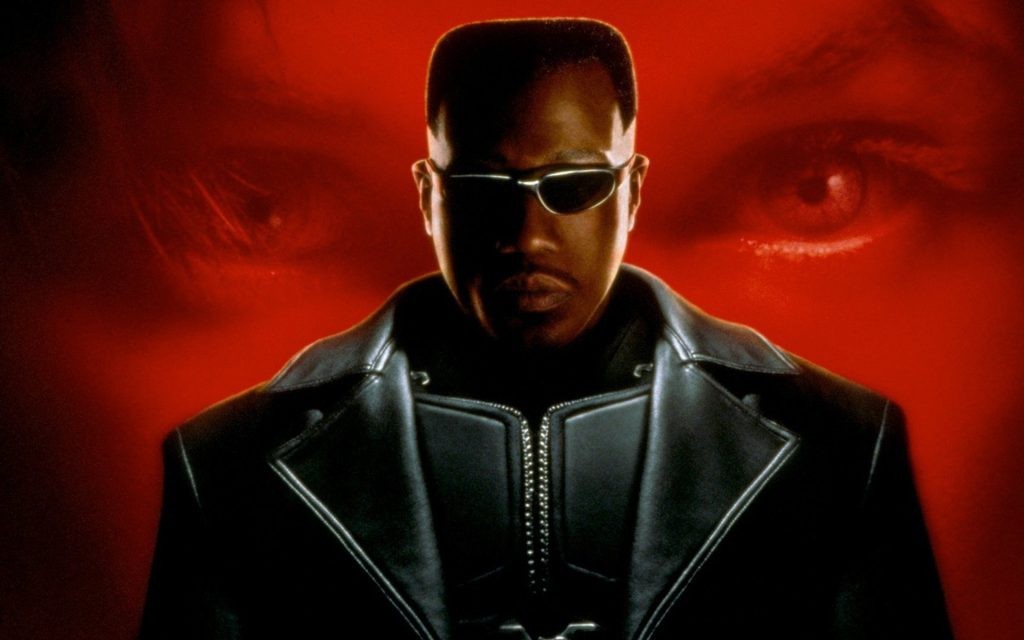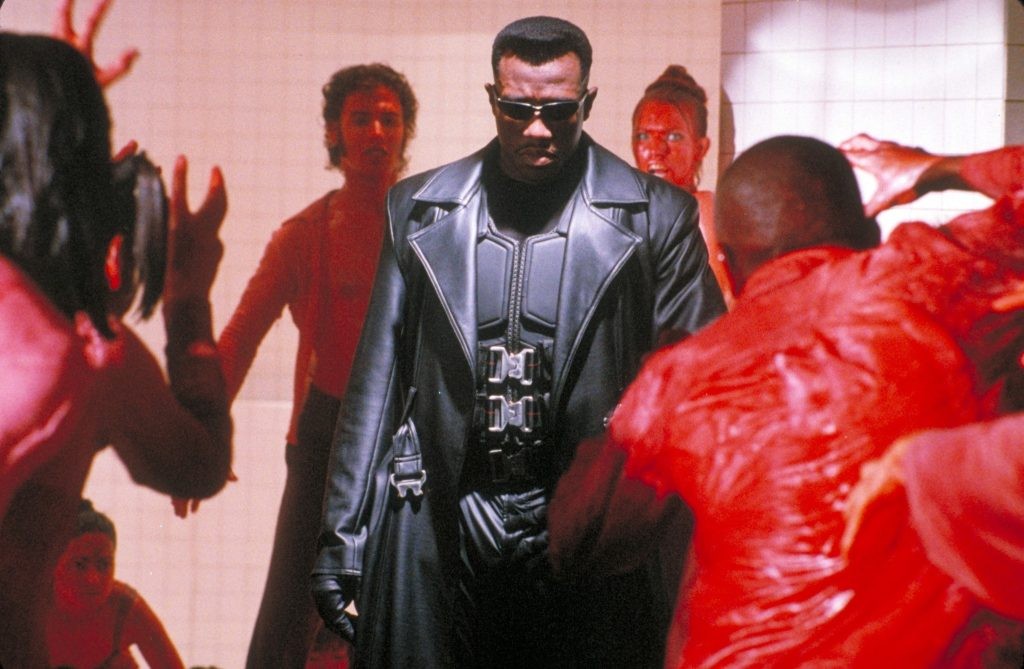In this FandomWire Video Essay, we explore how Blade saved Marvel from ruin.
Check out the video below:
Subscribe & hit the Notification Bell so you never miss a video!
This Is How Blade Saved Marvel
What is the most influential movie in the history of Marvel? Is it Avengers: Endgame? Joss Whedon’s original Avengers film from 2012? While a case can be made for both of these, arguably the most influential Marvel film of all time is… Blade?
That’s right, Blade. The half-human/half-vampire is not just a superhero but the real-life savior of Marvel Comics. It not only paved the way for the wave of comic book movies in recent decades but rescued Marvel Comics from one of the most tumultuous times in its history.
Today, comic book movies are similarly suffering. This time, the culprit is apparent “comic book movie fatigue.” Some have blamed the oversaturation of content between the DC Extended Universe, the Marvel Cinematic Universe movies, and the MCU shows on Disney+ — not to mention all of the comic-book-inspired films and shows that aren’t part of one of the two major canons. Others have claimed that it’s the quality of the content being put out.
The studios are desperately trying to find a way to return to the era when comic book movies were a sure-fire hit at the box office, virtually guaranteed to make hundreds of millions of dollars — if not more than a billion. To understand what can be done to correct the MCU’s course, we must look back to what made CBMs a lucrative genre in the first place.
There was a time before Marvel movies were the biggest event movies of the year. While this might have been hard to believe a mere few years ago, it’s not so far-fetched today as movies like The Marvels are bombing at the box office and critically. 1998’s Blade was the turning point that showed Marvel’s comic book IPs had legitimate value in Hollywood.
Of course, there were some very successful comic book movies before Blade. The early Superman movies and most of the Tim Burton/Joel Schumacher Batman films until the ill-fated Batman & Robin had been very profitable at the box office. However, it’s worth noting that both of these are DC characters. DC’s properties also had great success on the small screen, with popular shows based on Wonder Woman, Superman, and Batman. On the other hand, the only success Marvel had was The Incredible Hulk, starring Lou Ferrigno.
One of the reasons why superhero movies weren’t a surefire hit in the ‘80s and ‘90s was that comic books were still somewhat niche. The most popular superhero movies at the time were based on characters that had gained popularity thanks to the television adaptations of the characters more so than the comic books themselves. Other comic book movies, like Howard the Duck, mainly bombed at the box office.
The other reason why comic book movies were seemingly doomed is that they were pretty expensive to make. Take Howard the Duck, one of the most notorious Marvel bombs. The comic book adaptation carried a budget of $37 million yet only grossed $16 million in the U.S. On the other hand, the highest-grossing movie of the same year — 1986 — Top Gun, grossed $176 million against its $15 million budget.
At the same time, Marvel was experiencing significant financial troubles. The entire comic book industry was struggling in the 1990s, but Marvel was hit particularly hard, as seen by the company’s filing for bankruptcy in 1996. In an attempt to desperately raise money, Marvel resorted to selling off many of the film rights for their characters at the bottom dollar, which led to the fractured set-up we saw in the early 2000s, where different studios owned different characters.
However, Marvel’s previous film efforts had not been particularly successful. Howard the Duck was probably one of the biggest Marvel productions to that point, but it was a massive bomb both critically and financially. And don’t forget the ‘90s Fantastic Four movie that was supposedly so incredibly bad that it was deemed unreleasable. Thus, Marvel struggled to find a buyer willing to purchase the adaptation rights to Marvel’s library.
Then, along came Blade. Directed by Stephen Norrington and written by David S. Goyer, the 1998 film. No one would think this was meant to be a blockbuster on a budget of $30 million. However, the film took a character who was somewhat maligned by comic fans as a “lame” character and turned into someone cool, thanks to the generous liberties taken by Goyer and a charismatic interpretation of the character by the bad-a** Wesley Snipes.
This interpretation of the Daywalker paid off, as Blade was a pretty big success. The film made $70 million at the U.S. box office and a further $60 million internationally, recouping its $45 million budget. The critical reception was mixed to positive, with the film earning a 57% score on Rotten Tomatoes, but it has since gained a cult following thanks to a critical re-evaluation. After all, who doesn’t love a blood rave?
A big part of Blade‘s success is that it was a stylish vampire movie starring Wesley Snipes, not a nerdy comic book movie. The success of movies like Batman and Superman was because of the mainstream nature of those characters. By downplaying the comic-inspired background of the movie and emphasizing the horror-tinged aspects, it was able to appeal to audiences beyond the fans of the source material.
Because of this, the film also is entirely unafraid to defy expectations and change the source material. Before the movies, Blade in the comics was originally just a human immune to vampire bites. However, the film adaptation was so successful that future comics in the late 1990s retconned him into a half-human, half-vampire dhampir. If this isn’t proof of the movie’s massive impact on the company, what is?
One thing that Blade did that few comic book movies had done in the past was blend genres. Although Tim Burton’s Batman movies had some evident macabre and German Expressionist influences, none were an outright genre film. Blade, on the other hand, is an actual horror movie. Sure, it has plenty of action, but it’s also gory and sometimes even scary. This arguably set a precedent for the comic book movies that would come later and blur the lines of what we expect from superhero films, like Guardians of the Galaxy or even The Dark Knight.
Blade also showed that B, C, or even D-list characters could be successful — not just A-list characters. And unfortunately, Marvel had far more low-tier characters than they had A-listers. Marvel’s only A-list characters were Spider-Man and the X-Men. Even some of the most popular characters today, like Iron Man, weren’t that popular outside of hardcore comic book nerds until the beginning of the MCU.
In many ways, there probably never would have been an Iron Man movie had Blade not proven that these low-popularity characters could have commercial potential. At the height of the MCU, Marvel Studios took characters that few people had ever heard of — such as the Guardians of the Galaxy or Shang-Chi — and made blockbusters out of them. Although Blade never reached the blockbuster level, it was successful enough that it kicked off the wave of comic book movies as we know it.
The success of Blade was also rumored to have played a pivotal role in Fox’s decision to purchase the adaptation rights to the X-Men and the Fantastic Four and for Sony to acquire the adaptation rights for Spider-Man. These early 2000s PG-13 superhero movies were when comic book adaptations fully entered the mainstream, paving the way for the landscape of the 2010s, where comic book movies consistently ranked among the highest-grossing films year after year.
In retrospect, one almost has to wonder… is Blade really good enough of a movie to have become the savior of Marvel Comics? In many ways, no, it’s not. It’s not a particularly timeless or ambitious film, nor is it distinctively Marvel-esque. However, it is precisely what the studio needed at the time: fun. Marvel didn’t need a masterpiece at the time — all they needed was something that was enjoyable enough to appeal to mass audiences.
So, in the current crisis that Marvel faces, where the lowest-grossing movie in the MCU was just released — the first to gross less than $100 million — is Blade the solution the comic book company needs? Set to star Mahershala Ali as the vampire hunter, the new Blade film has experienced numerous production troubles. Some have wondered if it will even be able to keep its November 2025 release date.
However, many of the criticisms that have been levied against the recent entries in the MCU have targeted their goofy and humorous nature. Movies like Thor: Love and Thunder, Ant-Man and the Wasp: Quantumania, and The Marvels were less successful than expected, with many people theorizing that fans have become tired of the new tone and direction of the MCU post-Endgame.
Sure, Blade isn’t going to be an Endgame-level event movie, but it could be the reset the franchise needs to move forward. Since saying goodbye to some of the MCU’s leading heroes, the franchise has struggled to find a direction. If successful, Blade‘s darker vision could show that the franchise does not need constant wisecracks to resonate with audiences.
What do you think? Was 1998’s Blade a turning point in the history of Marvel Comics, or do you think it was something else? And is the upcoming reboot the solution to Marvel Studios’ current woes? Let us know in the comments below, and be sure to like and subscribe. As always, thanks for watching! Until next time!
Follow us for more entertainment coverage on Facebook, Twitter, Instagram, and YouTube.



